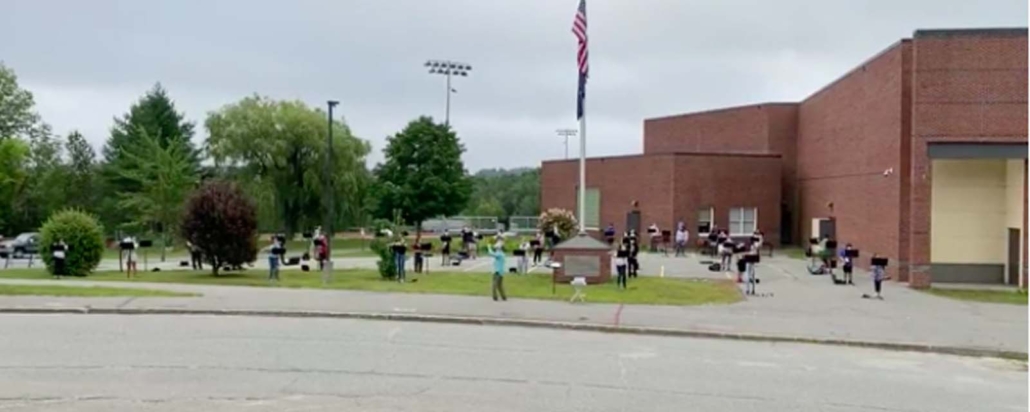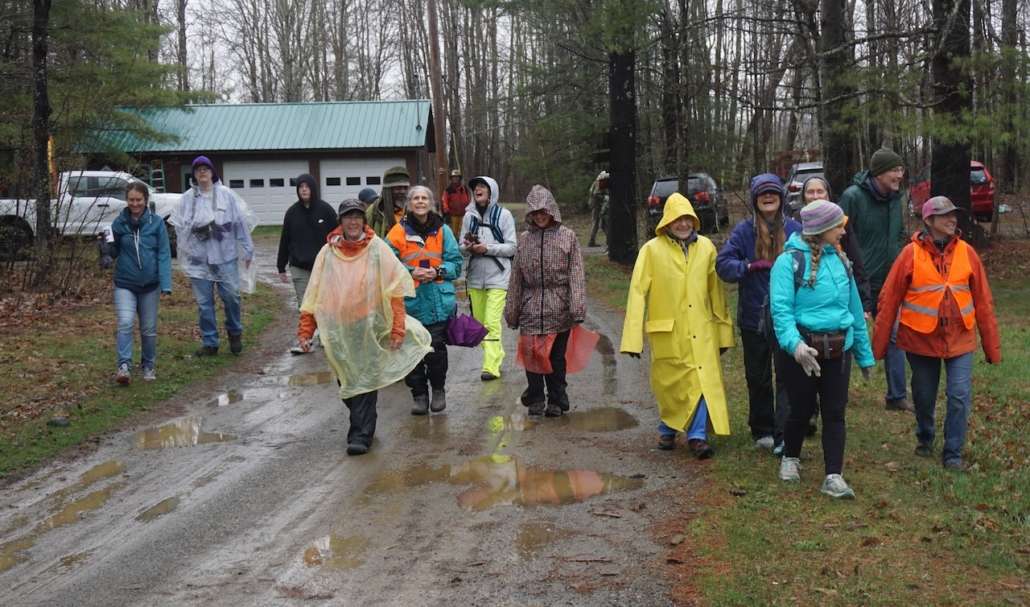MHS: Music in a coronavirus world

The Messalonskee High School band practicing outside, at the school, in Oakland. (contributed photo)
by Colin Hickey
MHS English teacher
Try playing a saxophone outside when the temperature is 47 degrees. It’s not easy, and it’s not particularly pleasant. But for members of the Messalonskee High School band program, playing outside has become a necessity in the year of the pandemic, a year in which the music could have died.
“It is doable,” Messalonskee band director Andy Forster said of the outside venue, “but your finger dexterity slows down quite a bit and tuning your instruments is just something you don’t worry about because you need room temperature to do that.”
Forster, though, accepts the inconvenience of playing in chilly weather, and he is willing to adapt in sundry other ways as well. For example, he runs 100 feet of cable outside from the Performing Arts Center so he can hook up a wireless mic to the sound system he reconfigured to work both inside and outside the auditorium. To set it up, he comes to school even earlier than in the past – another inconvenience he accepts as the price of keeping the music alive.
What he cannot preserve, at least for now, is the ability to practice and hold performances inside. The concerts and other musical events that used to fill the fall calendar have all been erased this year, and the sad reality, he said, is they might not return until next fall at the earliest.
But Forster said, “If you focus on what you can’t do, you’ll be stuck and paralyzed and once you do that, the students have lost. They’ve lost everything.”
So instead of bemoaning the losses, Forster celebrates what he can do. “I can be grateful that I work in this (school) district in that I get to see my kids and have my classes,” he said, sitting in his band room as he talked through his mask. “I’m grateful for the opportunity to be creative. That is not the case throughout the state.”
Forster talked of school districts in which music teachers have had to switch to teaching science and others in which they have become designated substitute teachers.
“It is all shades of bad,” he said of such situations. “As a music teacher, I can’t support any of those decisions.”
Forster realizes that he and his music program face many challenges ahead. As winter approaches, the temperatures will dip to the point in which playing outside no longer will be an option, but Forster already has plans to overcome that frigid reality.
He points to bundles of wooden rhythm sticks in his band room that he ordered. His vision is to distribute those percussion pieces to his students to transform them into a huge rhythm section spread safely across the Performing Arts Center. Forster said he has yet to write the arrangements and create the routines, but the instruments and the determination to put them to use are in place.
Such an approach to making music avoids the dangers caused when blowing into mouth pieces or, in the case of vocalists, breaking into song. Those two methods generate the aerosol emissions that epidemiologists say is a prime way to spread the corona virus and thus methods they warn to avoid at all costs.
Forster, who is married to a physician and has a brother in the medical field, understands full well the danger that his beloved music can generate. At the same time, he also understands that it’s vital to keep his students involved with music, and that gets back to his commitment to adapt rather than bemoan.
Along with his plan for the extensive rhythm section, Forster talks of shifting from performance to creation as the focal point of his program. Instead of playing in front of an audience, he will teach his students how to compose and arrange music – music, he hopes, they one day will be able to share with classmates and others in a world without the need for masks, a world once more filled with beautiful sounds.
Responsible journalism is hard work!
It is also expensive!
If you enjoy reading The Town Line and the good news we bring you each week, would you consider a donation to help us continue the work we’re doing?
The Town Line is a 501(c)(3) nonprofit private foundation, and all donations are tax deductible under the Internal Revenue Service code.
To help, please visit our online donation page or mail a check payable to The Town Line, PO Box 89, South China, ME 04358. Your contribution is appreciated!




Leave a Reply
Want to join the discussion?Feel free to contribute!